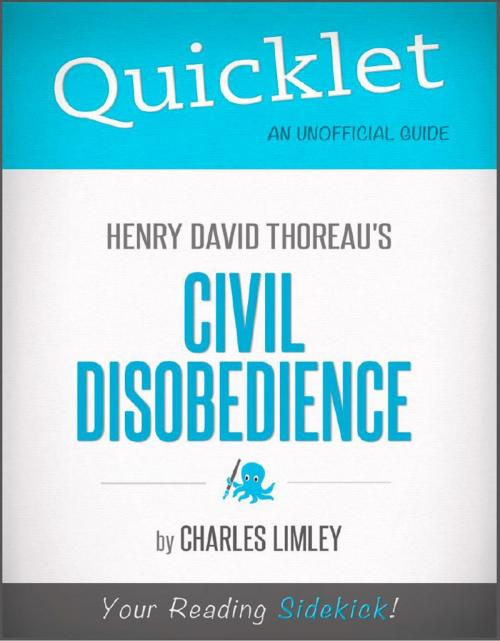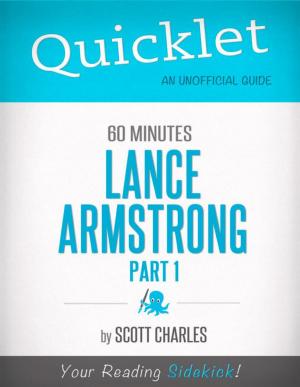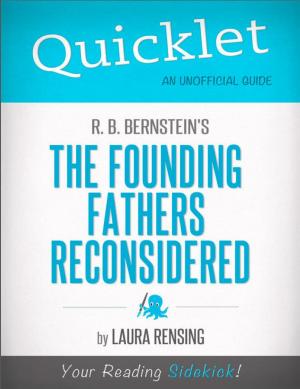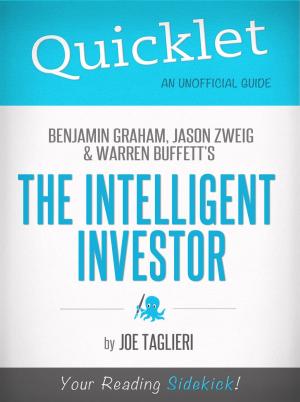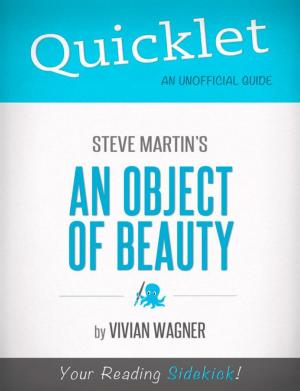Quicklet on Henry David Thoreau's Civil Disobedience
Nonfiction, Reference & Language, Study Aids, Book Notes, Art & Architecture, General Art| Author: | Charles Limley | ISBN: | 9781614646372 |
| Publisher: | Hyperink | Publication: | July 30, 2012 |
| Imprint: | Hyperink | Language: | English |
| Author: | Charles Limley |
| ISBN: | 9781614646372 |
| Publisher: | Hyperink |
| Publication: | July 30, 2012 |
| Imprint: | Hyperink |
| Language: | English |
ABOUT THE BOOK
Thoreau was a great writer, philosopher, poet, and withal a most practical man, that is, he taught nothing he was not prepared to practise in himself. . . .He went to gaol for the sake of his principles and suffering humanity. His essay has, therefore, been sanctified by suffering. Moreover, it is written for all time. In 1846, while conducting his famous philosophical experiment at Walden Pond, Henry David Thoreau was arrested and put in jail for refusing to pay a poll tax, the proceeds of which were intended to fund the United States’ efforts in the Mexican-American War. His basis for refusing to pay the tax was a moral one: he did not believe the U.S. should be fighting the war, so he chose to not help fund it.
While in jail, Thoreau composed a letter detailing his experience and his reasons for refusing the tax. This letter eventually became the framework for an impassioned lecture delivered on January 26, 1848 to an audience at the Concord, Massachusetts Lyceum. Thoreau’s ideas continued taking increasingly concrete shape as they were published in 1849 under the title “Resistance to Civil Government” in a relatively short-lived New England journal entitled Aesthetic Papers. In 1866, four years after his death, Thoreau’s essay was finally published as “Civil Disobedience” in a collection of his writings called A Yankee in Canada, with Anti-Slavery and Reform Papers.
In essence, “Civil Disobedience” argues that if a government begins exercising its power in unjust ways, the citizens of that government have a moral right—in fact, a moral obligation—to resist the unjust actions of the government.
EXCERPT FROM THE BOOK
“I became convinced that noncooperation with evil is as much a moral obligation as is cooperation with good. No other person has been more eloquent and passionate in getting this idea across than Henry David Thoreau. Civil Disobedience” is both a personal memoir and a social theory treatise, although it is certainly much more the latter. In explaining why he chose to disobey the law requiring him to pay a poll tax, Thoreau ends up offering an entire theory on the roles of governments and citizens, as well as articulating a strategy through which citizens of a government may work to bring about political change.
Thoreau immediately makes clear that his actions are in direct protest of what he believes to be the two greatest injustices being perpetrated by his society: slavery and the Mexican-American War. This is an important place to start, as it communicates that in order to be effective, any form of civil protest or disobedience to law must be made against very specific and identifiable political actions and with very specific objectives in mind. For Thoreau, slavery and the Mexican-American War violated his sense of justice, and so in order to avoid complicity in these actions, he needed to declare a personal break from the government. This he accomplished by avoiding the taxes used to fund the war.
This act of disobedience actually became most effective when Thoreau was punished for it. His arrest and time in jail represent an official recognition of his protest on the part of the government, while also exposing the government and its officials as operating strictly on the level of brute force, physical strength, and violence. What for Thoreau was a philosophical and moral decision, enacted through political means, was dealt with by the government in terms of physical imprisonment and force. This distinction is important as it lends credence to Thoreau’s ongoing metaphor of governments as inhuman machines standing either in service to or domination of its human counterparts. In this particular case, the government reveals itself to be an unthinking, irrational, and inanimate machine, dealing only on the level of physical strength and violence rather than reason and logic.
ABOUT THE BOOK
Thoreau was a great writer, philosopher, poet, and withal a most practical man, that is, he taught nothing he was not prepared to practise in himself. . . .He went to gaol for the sake of his principles and suffering humanity. His essay has, therefore, been sanctified by suffering. Moreover, it is written for all time. In 1846, while conducting his famous philosophical experiment at Walden Pond, Henry David Thoreau was arrested and put in jail for refusing to pay a poll tax, the proceeds of which were intended to fund the United States’ efforts in the Mexican-American War. His basis for refusing to pay the tax was a moral one: he did not believe the U.S. should be fighting the war, so he chose to not help fund it.
While in jail, Thoreau composed a letter detailing his experience and his reasons for refusing the tax. This letter eventually became the framework for an impassioned lecture delivered on January 26, 1848 to an audience at the Concord, Massachusetts Lyceum. Thoreau’s ideas continued taking increasingly concrete shape as they were published in 1849 under the title “Resistance to Civil Government” in a relatively short-lived New England journal entitled Aesthetic Papers. In 1866, four years after his death, Thoreau’s essay was finally published as “Civil Disobedience” in a collection of his writings called A Yankee in Canada, with Anti-Slavery and Reform Papers.
In essence, “Civil Disobedience” argues that if a government begins exercising its power in unjust ways, the citizens of that government have a moral right—in fact, a moral obligation—to resist the unjust actions of the government.
EXCERPT FROM THE BOOK
“I became convinced that noncooperation with evil is as much a moral obligation as is cooperation with good. No other person has been more eloquent and passionate in getting this idea across than Henry David Thoreau. Civil Disobedience” is both a personal memoir and a social theory treatise, although it is certainly much more the latter. In explaining why he chose to disobey the law requiring him to pay a poll tax, Thoreau ends up offering an entire theory on the roles of governments and citizens, as well as articulating a strategy through which citizens of a government may work to bring about political change.
Thoreau immediately makes clear that his actions are in direct protest of what he believes to be the two greatest injustices being perpetrated by his society: slavery and the Mexican-American War. This is an important place to start, as it communicates that in order to be effective, any form of civil protest or disobedience to law must be made against very specific and identifiable political actions and with very specific objectives in mind. For Thoreau, slavery and the Mexican-American War violated his sense of justice, and so in order to avoid complicity in these actions, he needed to declare a personal break from the government. This he accomplished by avoiding the taxes used to fund the war.
This act of disobedience actually became most effective when Thoreau was punished for it. His arrest and time in jail represent an official recognition of his protest on the part of the government, while also exposing the government and its officials as operating strictly on the level of brute force, physical strength, and violence. What for Thoreau was a philosophical and moral decision, enacted through political means, was dealt with by the government in terms of physical imprisonment and force. This distinction is important as it lends credence to Thoreau’s ongoing metaphor of governments as inhuman machines standing either in service to or domination of its human counterparts. In this particular case, the government reveals itself to be an unthinking, irrational, and inanimate machine, dealing only on the level of physical strength and violence rather than reason and logic.
